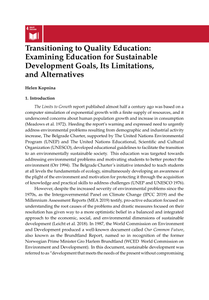This article will discuss the role of environmentalism in environmental education (EE) and education for sustainable development (ESD) in the context of ecopedagogy. Ecopedagogy calls for the remaking of capitalist practices and seeks to re-engage democracy to include multispecies interests in the face of our current global ecological crisis. In this article, the written reports by international business students on the documentary film If a Tree Falls about a radical environmental movement will be discussed. The aim of this article is to reflect upon the question of whether confrontational questions posed by radical environmentalism can move students to re-examine certain central assumptions within their own society and education. The analysis of students’ individual writing assignments after viewing the film is placed in the context of the discussion about the aims of education in relation to environmental advocacy. This case study seeks to provide an example of how environmental advocacy and the objective of pluralistic education can be combined as mutually supportive means of achieving both democratic learning and learning for environmental sustainability. https://doi.org/10.1177/0973408215569119 https://www.linkedin.com/in/helenkopnina/
MULTIFILE

Building on the Millennium Development Goals, Education for Sustainable Development (ESD) and Education for Sustainable Development Goals (ESDG) were established. Despite the willingness of many educational institutions worldwide to embrace the SDGs, given escalating sustainability challenges, this article questions whether ESDG is desirable as “an education for the future”. Many challenges outlined by the SDGs are supposed to be solved by “inclusive” or “sustainable” economic growth, assuming that economic growth can be conveniently decoupled from resource consumption. Yet, the current hegemony of the sustainability-through-growth paradigm has actually increased inequalities and pressure on natural resources, exacerbating biodiversity loss, climate change and resulting social tensions. With unreflective support for growth, far from challenging the status quo, the SDGs and consequently, the ESDGs, condone continuing environmental exploitation, depriving millions of species of their right to flourish, and impoverishing future generations. This article creates greater awareness of the paradoxes of sustainable development and encourages teaching for sustainability through various examples of alternative education that emphasizes planetary ethic and degrowth. The alternatives include Indigenous learning, ecopedagogy, ecocentric education, education for steady-state and circular economy, empowerment and liberation. “This is an Accepted Manuscript of an article published by Taylor & Francis in 'Journal of Environmental Education' on 01/20/20, available online: https://www.tandfonline.com/doi/full/10.1080/00958964.2019.1710444 LinkedIn: https://www.linkedin.com/in/helenkopnina/
MULTIFILE

Despite the willingness of many educational institutions worldwide to embrace Education for Sustainable Development and Education for Sustainable Development Goals, critical scholars have pointed out that the very enterprise of sustainable development is not without its contradictions. Therefore, any education that engages with sustainable development needs to be carefully reviewed, rather than supported, in its ambition to promote the supposedly universally desirable aims. The rhetoric of sustainable development as meeting the needs of present and future generations is largely anthropocentric in failing to take nonhuman species into account when setting up pragmatic and ethical objectives. Similarly to the Millennium Development Goals (MDGs) that have helped to raise living standards across the world, but have largely failed to address environmental sustainability challenges, the Sustainability Development Goals (SDGs) tend to prioritize “inclusive economic growth” at the expense of ecological integrity, which is very likely to negatively affect not only nonhuman species but also future generations and their quality of life. Thus, as this chapter will argue, universally applicable Education for Sustainable Development Goals (ESDGs) is problematic in the context of addressing the long-term sustainability for both human and nonhuman inhabitants of the planet. Given escalating climate change, biodiversity loss, pollution, and depletion of natural resources, this chapter questions whether ESDGs can qualify as a desirable “quality education”. The paradoxes of sustainable development and ways forward that seem a better alternative for ESDG include indigenous/traditional learning, ecopedagogy, ecocentric education, and education for degrowth, steady-state, and Cradle-to-Cradle and circular economy. Advantages of universal education are also highlighted, as any education that supports basic literacy, numeracy, and values attributed to the intrinsic rights of humans and nonhumans can help students to be equipped to deal with social and environmental challenges. https://doi.org/10.3390/books978-3-03897-893-0-1 LinkedIn: https://www.linkedin.com/in/helenkopnina/
MULTIFILE
